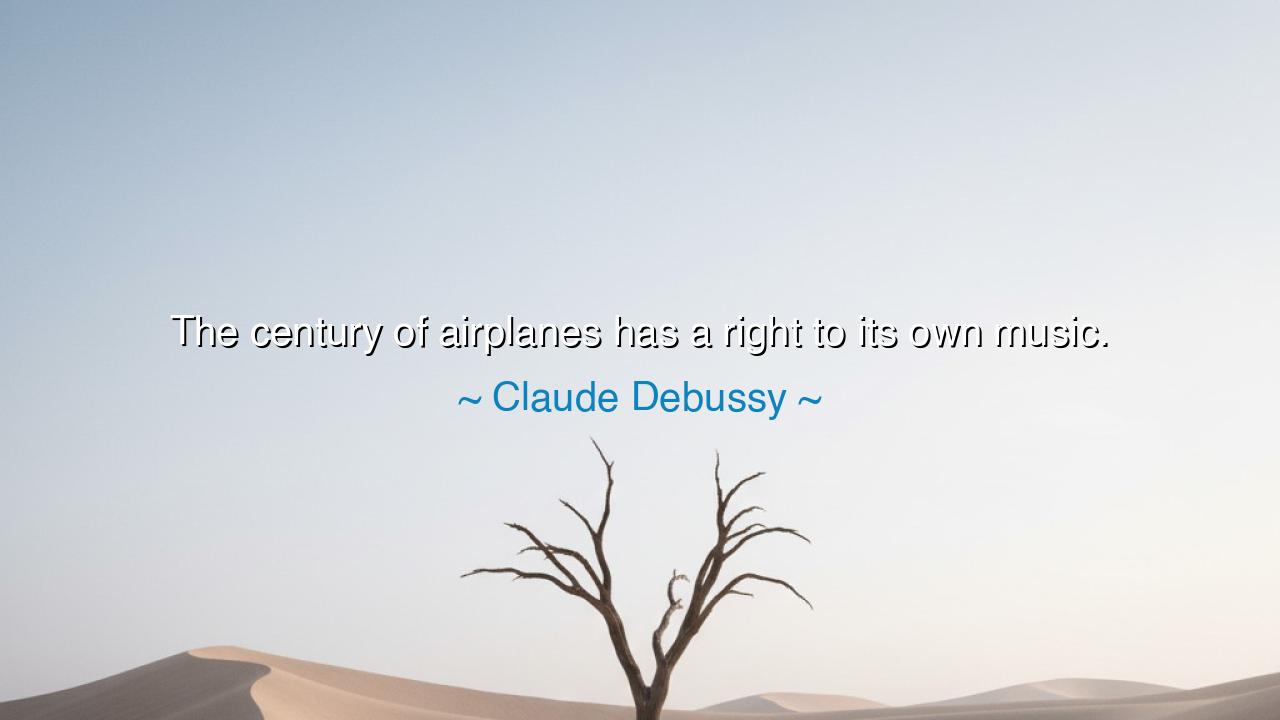
The century of airplanes has a right to its own music.






Hear the vision of Claude Debussy, who declared: “The century of airplanes has a right to its own music.” These words are not the musings of a dreamer only, but the call of a prophet who saw that every age must give birth to its own voice. Just as each dawn has its songbird, so too does each century demand a new harmony. Debussy knew that music must not remain frozen in the forms of the past, but must rise with the inventions, the discoveries, and the spirits of its time. For what is the worth of a new world, if its art still sings only the songs of yesterday?
The ancients knew this cycle well. When the Greeks built their temples and discovered new measures of thought, they birthed new modes of music, breaking free from the chants of older tribes. When the cathedrals of the Middle Ages rose to heaven, so too did sacred polyphony rise in echo, filling the arches with sound that matched the stones. Each age gave to itself what belonged to it—a sound, a rhythm, a voice uniquely its own. Debussy, beholding the birth of the airplane, recognized that the modern age, with its soaring heights and thunderous engines, demanded not the music of harpsichords and courts, but a new music, bold and unbound.
Consider the Wright brothers, who in 1903 tore humanity from the grip of earth and lifted it into the skies. That single flight was not only a conquest of science, but a revolution of the imagination. Man could now do what for centuries was reserved only for the gods and for birds. Such an achievement could not remain silent; it required a new music to accompany its wonder, a music that embodied speed, risk, and the freedom of air. Thus Debussy declared rightly: a new century, with new miracles, must be granted a new song.
Debussy himself forged this path. His works shattered the chains of traditional harmony, birthing sounds that floated like clouds and shimmered like water. He sought not the rigid forms of the past but the impression of the present—fleeting, daring, alive. In this way, he gave to his own age what it hungered for: a music that belonged not to kings in gilded halls, but to the restless spirit of modernity, which now stretched its wings toward the infinite sky. His words were not merely an observation, but a creed for all creators: that art must live with its time, or else it ceases to live at all.
Yet his wisdom also carries a warning. For those who cling too tightly to the music of the past risk suffocating the present. Just as the airplane could not be built with the methods of the ox-cart, so too can the music of the new world not be carried entirely by the forms of the old. Tradition may guide us, but if it enslaves us, the song of the age will remain unsung. Each generation must therefore ask: What is the sound of our time? What is the voice of our century? Without this courage, the soul of the age remains mute.
To you who hear these words, take them as a charge: embrace the new music of your own life. Do not fear to create, to innovate, to speak in forms unfamiliar. Whether in art, in work, or in the shaping of society, let your voice reflect the present moment with honesty and daring. Do not merely echo the past, though it may guide you—build upon it, transform it, and let it soar as the airplane soared, into heights unimagined.
Practical wisdom follows: listen for the sounds of your time. They may come from the hum of machines, the cries of protest, the laughter of children, or the silence of digital screens. Do not dismiss them, but weave them into your art, your thought, your life. For just as Debussy crowned the age of flight with new harmonies, so too must we crown our age with its rightful music.
Thus remember Debussy’s words: “The century of airplanes has a right to its own music.” Every age must sing its own song, and every person must add their voice to that chorus. Do not cling only to yesterday’s tunes; rise to meet the present, and in so doing, you will help carve the melody of tomorrow.






AAdministratorAdministrator
Welcome, honored guests. Please leave a comment, we will respond soon